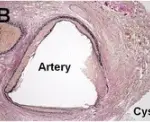Congenital pancreatic cysts are anomalies believed to result from anomalous development of the pancreatic ducts characterized by thin-walled unilocular cysts.
What is the Pathology of Congenital Pancreatic Cysts?
The pathology of congenital pancreatic cysts is: The study of a lesion lined by a glistening, duct-type cuboidal epithelium/completely attenuated cell layer. Cyst enclosed in a thin, fibrous capsule filled with a clear-to-turbid mucoid/serous fluid.
-Etiology: The cause of congenital pancreatic cysts is unknown.
-Genes involved: Unknown.
-Pathogenesis: The sequence of events that lead to congenital pancreatic cysts not clearly understood, and is likely multifactorial.
-Morphology: The morphology associated with congenital pancreatic cysts shows fibrous capsules and are filled with a clear-to-turbid mucoid or serous fluid.
-Histology: The histology associated with congenital pancreatic cysts shows cuboidal epithelium or by a completely attenuated cell layer.
How do Congenital Pancreatic Cysts Present?
Patients with congenital pancreatic cysts typically have a female to male ratio of 4:1 present at an age range of <10 years. The symptoms, features, and clinical findings associated with congenital pancreatic cysts include acholic stools in infants, recurring attacks of pancreatitis, jaundice, colicky abdominal pain, right upper quadrant mass, and cholangitis.
How are Congenital Pancreatic Cysts Diagnosed?
Congenital pancreatic cysts is diagnosed through radiological studies- abdominal ultrasonography, ct scan, MRI, and endoscopic ultrasonography (EUS).
How is Congenital Pancreatic Cysts Treated?
Congenital pancreatic cysts is may be left alone or treated with FNA and surgical excision depending on the size and type of cyst.
What is the Prognosis of Congenital Pancreatic Cysts?
The prognosis of congenital pancreatic cysts is generally good.



